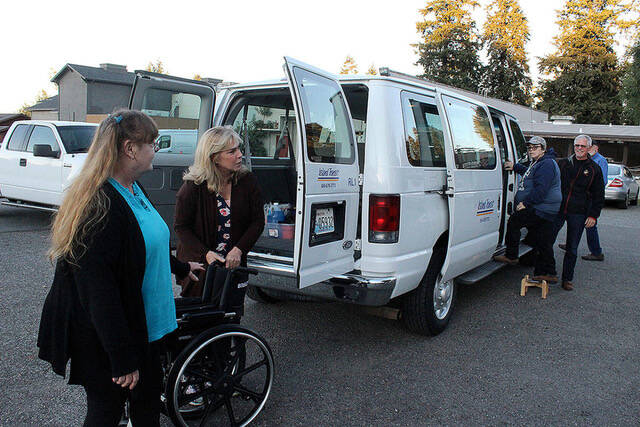By Patricia Guthrie
Special to The Record
The young man listens intently as Dana Sawyers goes over benefits and bureaucracies available to veterans like him, regardless of age, rank or years of service.
Then she asks how long ago he left the Marines.
“Friday,” says the 23-year-old.
Sawyers, an Air Force veteran and program coordinator and benefits specialist with the Whidbey Veterans Resource Center, had just gotten off the phone checking on Erma Aldous, a 99-year-old veteran who served in World War II as a nurse’s aide with the U.S. Navy Hospital Corps.
Young, old. Men, women. Days to decades since putting on their uniform.
Such is the range of people who walk, or wheel, through the doors of the resource center, tucked in the back of the South Whidbey Community Center in Langley.
For almost 15 years, the nonprofit organization has helped veterans with a range of topics and needs, including providing twice-a-week van shuttles to medical appointments at Seattle’s VA clinics.
It’s a barebones operation, dependent annually on $50,000 in private and corporate donations and $100,000 in grants.
Helping veterans through the gauntlet of government services and benefits is one role of the resource center. It also connects veterans with day-to-day needs, such as housing, counseling, health care and social groups.
Last year, it assisted 620 people; one-quarter of them seeking help for the first time. The center also fielded 3,885 phone calls, 2,000 text messages and completed nearly 300 healthcare or benefit claims — with Sawyers usually at the center of the advocacy action.
“She’s like a dog with a bone,” says longtime volunteer Kat Ersch. “She will get that benefit for you.”
Case in point — Don Wentworth, who served 30 years in active and reserve duty.
“I got my 100% disability benefit 70 years after I left Guam,” says the 93-year-old.
For him and many other elderly veterans, the resource center is a lifeline. Many are determined to stay put at home and they can only because center staff and volunteers connect them to a network of support.
But there’s still more work to be done.
Of the estimated 12,000 veterans on Whidbey Island, about 40% have yet to obtain benefits from the Veterans Administration and/or Veterans Healthcare, which is about the national average.
Overall, Island County has the highest number of veterans per capita in the state. Many are eligible for speciality medical care for service-related injuries, such as hearing loss. The federal PACT Act, passed last year, expanded health care for veterans exposed to burn pits and toxic substances, such as Agent Orange.
The U.S. Department of Veterans Affairs calls it “the most significant expansion of veteran benefits in more than three decades.”
Additionally, the VA clinic that recently opened in Everett is equipped with 32 exam rooms, state-of-the-art radiology equipment and many other outpatient services for veterans and their families.
The help doesn’t stop even when a veteran dies, another result of the PACT Act.
“This year, we’ve helped six surviving spouses receive the benefits they’re entitled to,” Sawyers said.
Whidbey Veterans Resource Center was founded in 2009 by Judith Gorman, a clinical social worker, and her husband Perry McClellan of Langley, who were seeking local services for their son, Orrin Gorman McClellan. He suffered many invisible wounds of war after serving in Afghanistan. He committed suicide at age 25.
The first year out of service can be the worst, which is why veterans are encouraged to quickly find a support system. Many wrestle with despair, depression, post-traumatic stress disorder, isolation, anxiety, violent outbursts and suicidal thoughts.
“The transition from active service to civilian life is itself a trauma,” says Chris Thorsen, who sits on the board of the non-profit organization. “They lose their identity, their mission and their tribe when they walk out the door.”
Sawyers remembers the strange feeling of suddenly being without a mission.
“It was a weird transition back to civilian life at my first job,” she recalled. “Everybody spoke a different language, I kept asking ‘what do I need to do?’ But they were all off at meetings or something.”
Sometimes veterans come in with the intention of “just helping” and find out they are the ones in need of help. Such was the experience of Gene Berg, who began volunteering at the center 10 years ago.
After a group of 15-20 Vietnam vets met regularly over the past summer to discuss long-buried memories, he felt as if a boulder had lifted from his body and soul.
“I thought I’d try and help other people but I got enormous help from other people,” he said.
Sawyers encourages the community to go beyond saying, “Thank you for your service” and consider donating monthly to the center — like public radio and television pledges.
“Ten bucks a month, the cost of two lattes, adds up to $120 a year,” she said. “Get enough people to do that, it will make a difference.”
The center also needs new volunteers to help connect veterans to benefits and programs; training sessions will be provided.
For more information on services, volunteering or donating funds, visit whidbeyvrc.org or call 360-331-8081.



